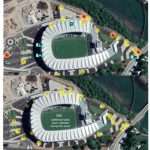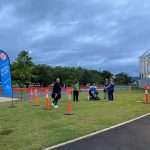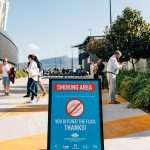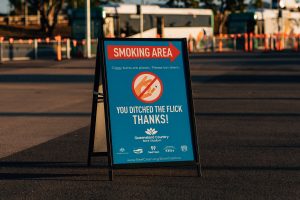Ditch the Flick® – Queensland Country Bank Stadium (QCBS)
Source Reduction Plan (SRP) Overview
Name of SRP
Partners Delivering the SRP
Tangaroa Blue Foundation & ReefClean – created, delivered & led the SRP
Queensland Country Bank Stadium – venue owner, delivery partner
Queensland Health – provide advice on outdoor smoking area requirements
Location
Queensland Country Bank Stadium, Townsville, QLD
Photo 1
Evidence of the issue

Photo 2
Evidence of SRP resources

Photo 3
Evidence of positive outcomes

Overall Goals & Background
Targeted Debris
Cigarette butts
Why is the SRP needed?
Whilst the majority of a cigarette is “biodegradable” what many are unaware of is that the butt/filter is made of plastic. Small plastic fibres, such as those from degrading cigarette butts, are an issue within the marine environment, with a particular focus on marine birds who mistake the debris as viable food for their offspring. The Queensland Country Bank Stadium (QBCS) grounds back directly onto the Ross River, which flows into the Great Barrier Reef, meaning that littered debris items can readily enter the marine environment following strong winds or heavy rainfall.
The project plans to reduce the amount of cigarette butts littered during major sporting events by providing the public with Designated Outdoor Smoking Areas (DOSAs) and specialised butt bins for the proper means of disposal.
Logistics
Timeline and Project Goals
Nov 2020 – July 2021
Before the beginning of the National Rugby League (NRL) 2021 season, the team at Tangaroa Blue Foundation conducted baseline cigarette butt surveys around the perimeter of QBCS to identify hotspots. Two baseline audits were conducted; one of the 9th of November 2020 and the other on the 27th of January 2021.
Then DOSAs were installed around the stadium and audits were conducted at five games from March – July. These were advertised on TV screens throughout the stadium and on QCBS social media platforms and their website to engage patrons.
Measuring Success
This SRP was deemed successful if a reduction in cigarette butt litter was found after implementing the DOSAs and directional signage.
This was measured by litter audits pre, during, and post-game, as well as observational studies noting how people were choosing to dispose of their cigarette butts.
Data Collection & Reporting
Cigarette butts were collected and counted to determine the effectiveness of the DOSAs, signage, and butt bin locations. These audits were conducted before DOSAs were implemented to highlight debris hotspots. Once the DOSAs were in place, audits were conducted before the event, during the event (half-time), and after the event.
Pre-event audits were conducted to ensure that any remnant cigarette litter was removed from the perimeter of QCBS to allow for an accurate representation of the accumulation of this type of litter as a direct result of the monitored event. A CyberTracker device was used during the collection of the post-event cigarette litter audits, which uses GPS to track where the butts were being littered. This allowed heatmaps to be created to monitor the effectiveness of the DOSA locations.
Tangaroa Blue Staff also conducted observational studies by observing spectator behaviour in and out of the DOSAs for a 15-minute interval. These observational studies were performed using the NSW EPA Litter Prevention Kit – Butt Litter Check Guidelines. The spectator’s gender was noted along with their method of cigarette disposal, which was categorised as “butt bin”, “bin” or “flick” disposal.
Results and Reflections
Positive Outcomes
There was a significant reduction in the amount of cigarette butt and filter litter at every game when compared to the pre-implementation of the DOSAs. This reduction varied anywhere from 68 to 79% over the following five games when compared to the pre-DOSA game (Game 1). When comparing as a per capita figure, the Ditch the Flick project managed to accomplish, on average, a 66% reduction in cigarette butt and filter litter at QCBS since the implementation of the DOSAs, with very promising results at the end, demonstrating a 70% reduction.
There was an overall increase of 100% in butt bin usage after the DOSA implementation around Gate A. Coupled with this positive result was an overall 36% decrease in the incorrect disposal method (“Flicking”).
The observational studies highlight that the majority (93%) of spectators who chose to smoke within the DOSA did dispose of their cigarette butt correctly by using the butt bins provided.
During the half-time observational studies, it was found that more spectators were likely to do the wrong thing due to the added pressure of time management (half-time is only a 20-minute break). It has been found that more spectators will participate in smoking within the earliest convenient space, which has resulted in less than half (48%) of the spectators observed smoking within the DOSA. Since there are no butt bins provided external to the DOSA ,this has resulted in an overall significant increase (39%) in the incorrect disposal of cigarette butts (referred to as “Flick”).
Community engagement was a very important part of the success of this initiative, with advertisements of DOSAs and the Ditch the Flick message being broadcast across screens throughout the stadium. Directional signage was also crucial so DOSAs could be easily identified. The Queenslander Article summarises the impacts and results of this campaign.
Funding
This project was part of the ReefClean project. ReefClean is funded by the Australian Government’s Reef Trust and delivered by Tangaroa Blue Foundation. The cost of this SRP was $10,000 AUD in addition to in-kind and financial support from the Queensland Country Bank Stadium.
Challenges & Improvements
Despite a successful first year for the “Ditch the Flick” source reduction plan at QCBS, cigarette butts and filters remain the highest recorded debris item (Ditch the Flick Report). However, since the implementation of the DOSAs in March, there has been a significant decrease in cigarette litter per capita during the 2021 NRL season at QCBS.
Clear signage to DOSAs and bins is important, especially during busy games and short breaks (half-time).
Future Opportunities
This project inspired Litter Hero, a project focussed on general litter audits around the stadium (not just cigarette litter). Both projects have since been handed over to Queensland Country Bank Stadium staff and continue to be implemented at events occurring at the stadium.

